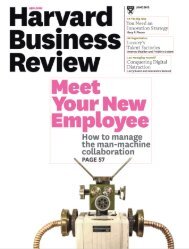+ + +
You also want an ePaper? Increase the reach of your titles
YUMPU automatically turns print PDFs into web optimized ePapers that Google loves.
PHOTOS © SHUTTERSTOCK/PROMETHEUS72 (BRANSON, GATES); PHOTO © GETTY IMAGES/BLOOMBERG /CONTRIBUTOR (QUIGLEY)<br />
cycle of an organization. “I would bet that<br />
at the early stages of a venture startup,<br />
ambiversion is more important than it is<br />
later,” he says. “In the early phases, you<br />
have to play more roles. There are fewer<br />
opportunities to delegate and adjust what<br />
your responsibilities are. As you grow,<br />
it’s much easier to carve out a role that<br />
allows you to operate effectively in your<br />
introverted niche or in your extroverted<br />
niche. Maybe ambiverts would have<br />
higher rates of early startup success, and<br />
those differences would vanish once companies<br />
hit some kind of stride.”<br />
Time will tell whether Grant’s theory<br />
is correct; research into the ambivert<br />
profile is still in its infancy, and the<br />
concept remains on the fringes of the<br />
popular consciousness. But with a<br />
growing number of academics turning<br />
their attention to personality psychology<br />
and its impact on all facets of human life,<br />
major breakthroughs could be within<br />
reach, Little believes.<br />
“What’s exciting is that we’re getting<br />
away from the ‘Are extroverts better<br />
than introverts?’ logic and starting to<br />
look at some of the more subtle aspects<br />
of why we do the things we do and<br />
how they involve managing the balance<br />
between our natures and what I call our<br />
‘socio-genetic motives’—our cultural expectations,<br />
our work and so on,” he says.<br />
“We’re all a bit more complex than simple<br />
types of being.”<br />
RADICALS AND VISIONARIES<br />
In the absence of personality-test results or other hard<br />
data, we can only speculate where leading entrepreneurs<br />
fall along the psychological continuum. But the available<br />
evidence suggests that most are ambiverts.<br />
“RICHARD BRANSON<br />
is probably an ambivert,”<br />
says Adam Grant, professor<br />
at The Wharton School.<br />
“We see his extroverted<br />
behaviors most vividly,<br />
but if you look at the sheer<br />
amount of time he spends<br />
writing and reflecting, or<br />
some of his discomfort with<br />
public speaking, we can<br />
make a prediction that<br />
he’s less extroverted than<br />
he appears.”<br />
“BILL GATES likely<br />
would be an example of an<br />
ambivert,” author Daniel<br />
Pink says. “Here’s a guy<br />
who’s stimulus-seeking<br />
and risk-taking—he drops<br />
out of Harvard and goes to<br />
Albuquerque, of all places,<br />
to start a company. That’s<br />
risk-prone behavior. But he’s<br />
also a guy who leaves work<br />
for one or two weeks every<br />
year to go off by himself and<br />
read, which is very much<br />
introverted behavior.”<br />
“JIM QUIGLEY, who was<br />
the CEO of Deloitte for some<br />
time, noticed that when he<br />
walked into a room, people<br />
would shut up and listen for<br />
him to talk,” Grant says. “I<br />
don’t know where he falls<br />
on the personality spectrum<br />
by default, but he very<br />
deliberately decided to act<br />
more like an ambivert and set<br />
a goal that he was only going<br />
to talk during 20 percent of<br />
meetings, max. When you<br />
do that and let other people<br />
carry the floor 80 percent of<br />
the time, you are more or less<br />
mimicking the advantages of<br />
being an ambivert. You get to<br />
hear other ideas, and people<br />
feel more empowered.”<br />
I call ‘beta culture,’ which I<br />
compare to an orchestra.<br />
You have virtuosos in all areas,<br />
and you organize around<br />
tasks and what needs to be<br />
done, with many voices and<br />
a conductor who brings them<br />
all together.”<br />
According to Ardi, alpha<br />
culture emerged in the<br />
Industrial Age and crystallized<br />
in the years following World<br />
War II. The organizing principle<br />
took its cues from military<br />
hierarchy, with a general—<br />
the CEO—serving as a<br />
centralized decision-making<br />
authority, issuing orders to<br />
the lieutenants, sergeants<br />
and privates serving under<br />
him. That approach no longer<br />
works, Ardi believes.<br />
“Contemporary leaders<br />
are betas,” she proclaims.<br />
“They are good listeners, they<br />
understand how to mine organizations<br />
and curate them,<br />
and they have an amazing<br />
sense of communication.<br />
They’re not leaders in that all<br />
decisions have to come from<br />
them—they drill down to make<br />
sure that everyone in the organization<br />
is sharing ideas and<br />
playing well together.”<br />
The beta mindset must<br />
extend to all facets of a company,<br />
from how its physical<br />
space is organized to how<br />
employees communicate to<br />
how teams are rewarded for<br />
their efforts. “Then [betas]<br />
need to bring people together<br />
and have the community start<br />
to brainstorm around how they<br />
can become more effective at<br />
all of the markers of being a<br />
beta culture,” Ardi says. “What<br />
are the challenges of our<br />
company moving forward?<br />
What are the things we want<br />
to get better at? What are<br />
the opportunities for us in the<br />
marketplace? What are the<br />
things we’ve been doing that<br />
we take for granted that maybe<br />
we need to rethink? There’s<br />
a whole internal dialogue to<br />
becoming self-actualized.”<br />
There are risks, Ardi warns.<br />
Some entrepreneurs embrace<br />
the beta concept too aggressively,<br />
opening up all discussions<br />
and decisions to internal<br />
debate. “Doing that becomes<br />
groupthink,” she says. “The<br />
best advice I can offer is to<br />
be what I call a ‘productive<br />
narcissist’—to believe in your<br />
idea, to understand the direction<br />
you want to go and how<br />
you want to move the group,<br />
but to be open, to be a good<br />
listener, to be a good communicator,<br />
to seek advice and<br />
counsel, to do something with<br />
that advice, and to always<br />
challenge common wisdom.”<br />
In other words: Be an<br />
ambivert. —J.A.<br />
MARCH 2015 ENTREPRENEUR 41






